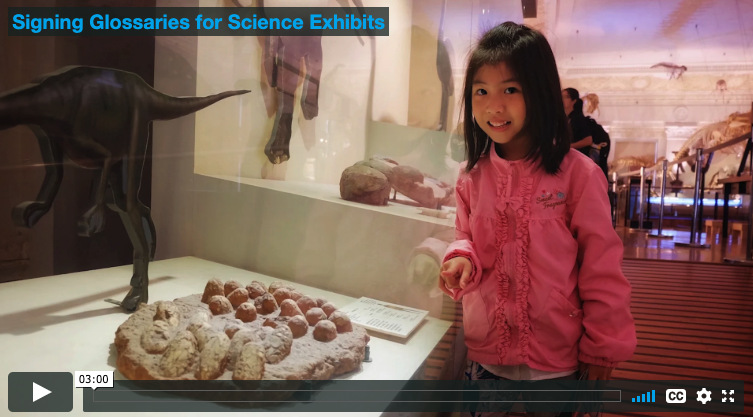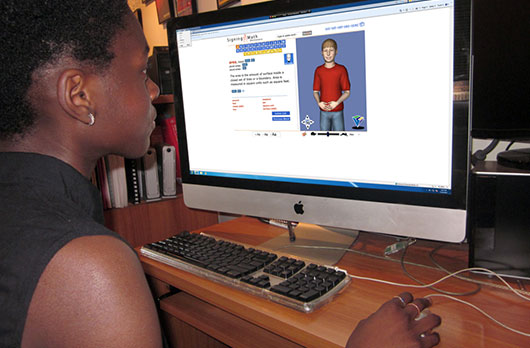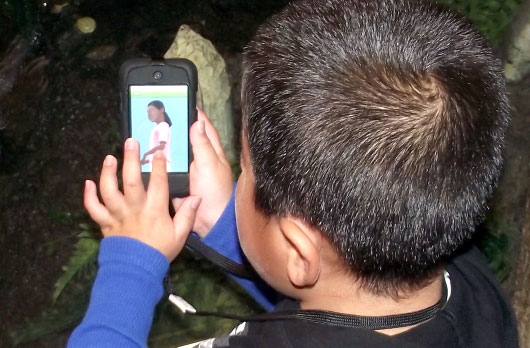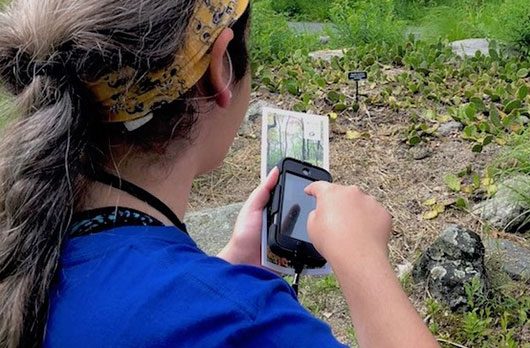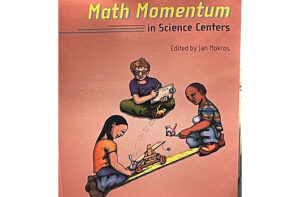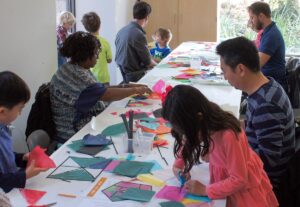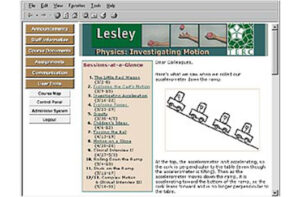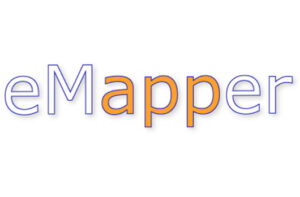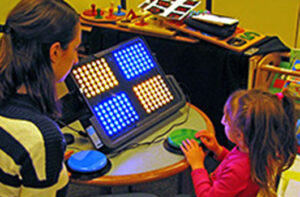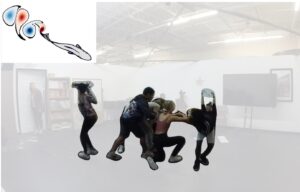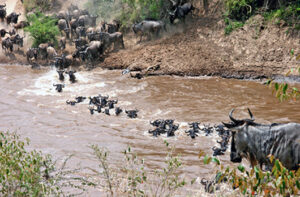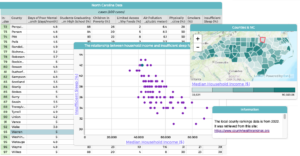Signing Glossaries for Science Exhibits
Researched and developed six separate glossaries to provide visitors who are deaf or hard of hearing access to exhibit content.
Lead Staff:
Judy VeselProject Staff:
Tara RobillardSummaryDeaf and hard of hearing children typically have literacy levels that lag behind those of their hearing peers, making access to captions, labels, instructions, and information difficult. This, in combination with a lack of interpreters, to sign material for them and parents who often do not have a robust signed technical vocabulary make visits to museums a low priority. The Signing Science Glossaries for Science Exhibits helped bridge these gaps by enabling on-the-fly access to the signed vocabulary families likely encounter during museum visits. The glossary apps were six venue-specific signing glossaries researched and developed for deaf and hard of hearing individuals, age 5 and above, who visited informal learning venues.
Each glossary provided access to thousands of signed terms and definitions specifically for aquariums, botanical gardens, natural history museums, nature centers, science museums, and zoos. There were numerous ways people interacted with the glossary apps to enrich their museum visits. People selected terms from lists or typed them into a search box, saw an Avatar character sign the term and its definition, listened to a human voice speaking the English text, opened and closed an illustration with a single click, and played or replayed the term over and over.
Research ActivityThe research should revealed how this approach benefited those with other types of disabilities. The research questions were designed to understand both how family members might interact with a hearing disabled family member as well as how the disabled individual might learn more about a variety of STEM content in a setting that is not domain specific but uses the influence of science exhibits to inform, engage and interest members of the public generally.
ImpactThe words of a parent who has used the glossaries during visits is a testament to the value they add to the experience: “We are most impressed at the versatility of the glossaries. Our daughter loves visiting all of these places, but we often avoided them because we were unsure what value they’d have without the rich explanations we were able to give to our boys, who are both hearings. The glossaries enriched not only her experience but ours as well by helping us to feel more connected to her during visits. Sometimes as a hearing parent of a child who is deaf, you feel ill-equipped to provide your child with the best educational support. This is particularly true when it comes to science and math. Our experiences have all been positive, regardless of the type of museum we are visiting.”
VideosHands On! ArticleGlossary Apps for Signing Science Exhibits
Feature // By Judy Vesel & Tara Robillard 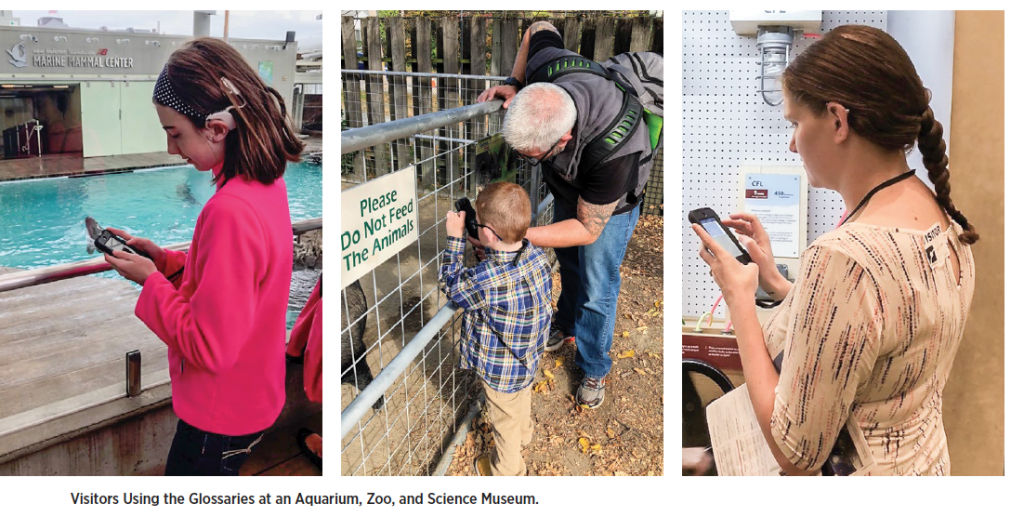 Read More
Read More
Deaf and hard of hearing children typically have literacy levels that lag behind those of their hearing peers, making access to captions, labels, instructions, and information difficult. This, in combination with a lack of interpreters, to sign material for them and parents who often do not have a robust signed technical vocabulary make visits to museums a low priority. The Signing Science Glossaries for Science Exhibits helped bridge these gaps by enabling on-the-fly access to the signed vocabulary families likely encounter during museum visits. The glossary apps were six venue-specific signing glossaries researched and developed for deaf and hard of hearing individuals, age 5 and above, who visited informal learning venues.
Each glossary provided access to thousands of signed terms and definitions specifically for aquariums, botanical gardens, natural history museums, nature centers, science museums, and zoos. There were numerous ways people interacted with the glossary apps to enrich their museum visits. People selected terms from lists or typed them into a search box, saw an Avatar character sign the term and its definition, listened to a human voice speaking the English text, opened and closed an illustration with a single click, and played or replayed the term over and over.
The research should revealed how this approach benefited those with other types of disabilities. The research questions were designed to understand both how family members might interact with a hearing disabled family member as well as how the disabled individual might learn more about a variety of STEM content in a setting that is not domain specific but uses the influence of science exhibits to inform, engage and interest members of the public generally.
ImpactThe words of a parent who has used the glossaries during visits is a testament to the value they add to the experience: “We are most impressed at the versatility of the glossaries. Our daughter loves visiting all of these places, but we often avoided them because we were unsure what value they’d have without the rich explanations we were able to give to our boys, who are both hearings. The glossaries enriched not only her experience but ours as well by helping us to feel more connected to her during visits. Sometimes as a hearing parent of a child who is deaf, you feel ill-equipped to provide your child with the best educational support. This is particularly true when it comes to science and math. Our experiences have all been positive, regardless of the type of museum we are visiting.”
VideosHands On! ArticleGlossary Apps for Signing Science Exhibits
Feature // By Judy Vesel & Tara Robillard  Read More
Read More
The words of a parent who has used the glossaries during visits is a testament to the value they add to the experience: “We are most impressed at the versatility of the glossaries. Our daughter loves visiting all of these places, but we often avoided them because we were unsure what value they’d have without the rich explanations we were able to give to our boys, who are both hearings. The glossaries enriched not only her experience but ours as well by helping us to feel more connected to her during visits. Sometimes as a hearing parent of a child who is deaf, you feel ill-equipped to provide your child with the best educational support. This is particularly true when it comes to science and math. Our experiences have all been positive, regardless of the type of museum we are visiting.”
Hands On! ArticleGlossary Apps for Signing Science Exhibits
Feature // By Judy Vesel & Tara Robillard  Read More
Read More
Glossary Apps for Signing Science Exhibits
Feature // By Judy Vesel & Tara Robillard  Read More
Read More
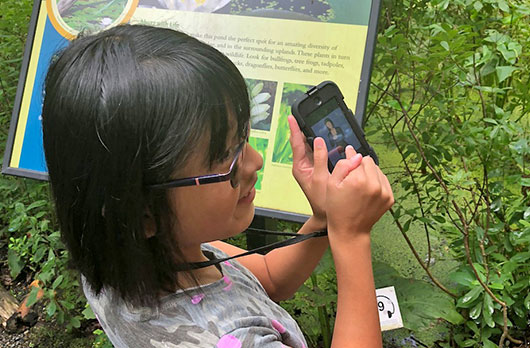
Funder:
National Science Foundation
Award Number:
1602284
This project is no longer active. To see a list of current TERC projects, please click here.
Share This Page:
